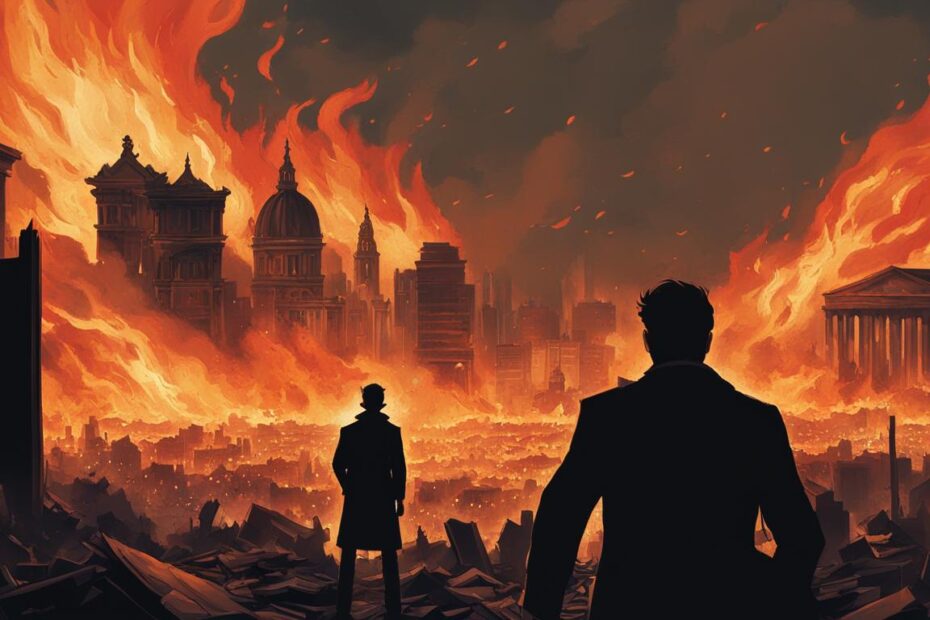As a thought-provoking and timeless work, Ray Bradbury’s “Fahrenheit 451” leaves a lasting impression on readers through its remarkable narrative and symbolism. One of the most discussed aspects of this novel is the gripping finale, which is equal parts catastrophic and hopeful. In this article, I will explore how the book Fahrenheit 451 ends and why this conclusion is so resonant, as well as provide a summary of Fahrenheit 451 ending that ties together the novel’s key themes.
Key Takeaways
- The novel’s ending sees protagonist Montag fleeing from his city, which is ultimately destroyed by an atomic bomb.
- A group of intellectuals in the countryside, committed to preserving books by memorizing their contents, offers Montag refuge and a newfound sense of purpose.
- As the story progresses, the escalation of societal violence mirrors Montag’s transformation from a fireman to a rebel against oppressive norms.
- The annihilation of the city and the emergence of Montag’s intellectual community reflect themes of desolation, hope, and rebirth.
- The suddenness and ambiguity of the ending add to the novel’s surreal and disorienting quality, while also leaving the reader with a poignant message of faith and resilience.
The Escalation of Societal Violence and Montag’s Transformation
In Ray Bradbury’s Fahrenheit 451, violence permeates the society as firemen destroy books and homes, and brutality becomes normalized in entertainment and on the streets. This culminates in the outbreak of war, which brings the societal unrest to its extreme, echoing the fahrenheit 451 plot resolution and highlighting the intensity of the ray bradbury ending.
Initially, Montag, the protagonist, is a fireman complicit in this violence. However, as the story progresses, a profound transformation occurs within him. Encounters with his neighbor Clarisse, the traumatic suicide attempt of his wife Mildred, and witnessing a woman choosing to burn with her books, all lead Montag to question the foundations of his society.
This internal conflict is mirrored by the societal chaos, culminating in Montag’s eventual rebellion against the norms and his escape from the city. Montag’s transformation plays a crucial role in deciphering how does the book Fahrenheit 451 conclude.
As Montag grapples with his newfound beliefs and tries to come to terms with the reality he has long been a part of, the novel dives deep into themes of censorship and the power of knowledge. In the end, Montag’s metamorphosis from a tool of oppression to a seeker of truth showcases Bradbury’s critique of a society that embraces ignorance and violence over wisdom and humanity.
Ray Bradbury’s Paradoxical Blend of Desolation and Hope

The Fahrenheit 451 conclusion is marked by an intriguing mix of calamity and optimism. Ray Bradbury masterfully crafts an ending that teeters between despair and hope, making the reader question not only the characters’ futures but also the resilience of humanity itself.
The Symbolic Annihilation and Rebirth
As the city is obliterated by an atomic explosion, the violent act serves as a symbolic annihilation of a society mired in superficiality and censorship. Yet from these ashes, the novel hints at the potential for rebirth, embodied by the group of intellectuals Montag joins. This group, committed to preserving literature and wisdom, offers a flicker of hope amidst the devastation. The annihilation and anticipated rebirth mirror the myth of the Phoenix, a motif that emphasizes the cyclical nature of destruction and creation—symbolic elements that flawlessly capture how did the book Fahrenheit 451 end.
The Emergence of a New Intellectual Community
The newfound group that Montag becomes part of consists of individuals who have taken it upon themselves to memorize entire works of literature, essentially becoming living books. Their very existence symbolizes resistance against oppressive norms and provides a framework for a future where knowledge can be revived and cherished. The formation of this intellectual community underscores human resilience and the importance of preserving culture in even the darkest of times.
Montag’s Pivotal Role in a Reimagined Future
Montag’s transformation culminates in his key role within the band of intellectual individuals. He transitions from a pawn in the destructive machinery of his former society to become a leader in the pursuit of a reconstructed, enlightened world. His memorization of Ecclesiastes marks both an end to his former life of ignorance and conformity and a step towards a future of contemplation and rebuilding—a world that celebrates the human spirit and the power of knowledge. Thus, the Fahrenheit 451 conclusion is a fitting wrap-up to Montag’s journey, underlining his crucial role in shaping the narrative’s trajectory and imparting hope amidst devastation.
Reflections on the Suddenness and Ambiguity of “Fahrenheit 451” Ending
The concluding section of “Fahrenheit 451” is often characterized by readers as abrupt and ambiguous. The surprise of the war’s quick resolution contrasts with the expected might and resilience of Montag’s city. This sudden development in the novel’s plot resolution serves to underscore the surreal and disorienting quality of the book’s ending, leaving readers grasping for meaning beyond the simple destruction of a society.
Adding to the sense of uncertainty, characters’ vision-like encounters further blur the line between reality and perception. Montag’s hallucinatory moment, in which he imagines his wife Millie, his ally Faber, and the deceased Clarisse in the wake of the city’s destruction, raises questions about the true nature of events in the book Fahrenheit 451 ending. Despite the unsettling quality, these moments ultimately contribute to the novel’s poignant exploration of hope and faith.
Despite the jarring nature of the conclusion, Ray Bradbury leaves readers with a note of optimism through Montag’s memorization of religious text. This symbolic act demonstrates to readers the potential for guiding principles and beliefs to carry humanity forward, regardless of religion or creed. Consequently, how the book Fahrenheit 451 ends serves as a testament to the enduring human spirit, the power of knowledge, and the indomitable need for progress even in the face of overwhelming adversity.
FAQ
How does "Fahrenheit 451" end, and what is the significance of the conclusion?
“Fahrenheit 451” ends with protagonist Montag fleeing a city in the throes of war and finding refuge among a group of intellectuals who have memorized books to preserve their content. The city is destroyed by an atomic bomb, and Montag, along with his new allies, journey towards the ruins to rebuild society. The conclusion combines violence and hope, symbolizing the potential for a rebirth of human knowledge and culture from destruction.
What is the role of violence throughout the novel, culminating in the war and destruction of the city?
Violence permeates the society in “Fahrenheit 451,” including the destruction of books and homes by firemen and the normalization of brutality in entertainment and in the streets. The outbreak of war and the subsequent destruction of the city represent an extreme manifestation of societal unrest, which Montag rebels against after questioning the foundations of his society.
What does the intellectual community that Montag joins signify in terms of the novel’s themes?
The intellectual community Montag joins is determined to preserve literature and wisdom, representing hope and the potential for a rebirth from the ashes of a destroyed society. Their existence highlights the human capacity for resilience, the importance of preserving culture, and the potential to rebuild a world that cherishes knowledge and free thought.
How does Montag’s transformation throughout the novel reflect the overall themes and ideas presented in the story?
Montag’s transformation from a pawn in a destructive society to a leader in the pursuit of a reconstructed, enlightened world mirrors the themes of oppression, individual thought and the power of knowledge. His journey is marked by encounters that force him to question societal norms and eventually join a community determined to maintain human knowledge and culture.
In what ways does the ending of "Fahrenheit 451" incorporate ambiguity and surrealism, and why might Ray Bradbury have chosen to conclude the novel in this manner?
The ending of “Fahrenheit 451” is marked by abruptness, abrupt war resolution, and vision-like encounters that add an element of surrealism. Montag’s hallucinatory moment of imagining his wife, Faber, and Clarisse in the destroyed city questions reality and perception. Bradbury’s choice to end the novel in this manner allows for the reader to ponder the significance of hope and faith, as Montag’s memorization of Ecclesiastes suggests a potential for guiding principles to carry humanity forward.
